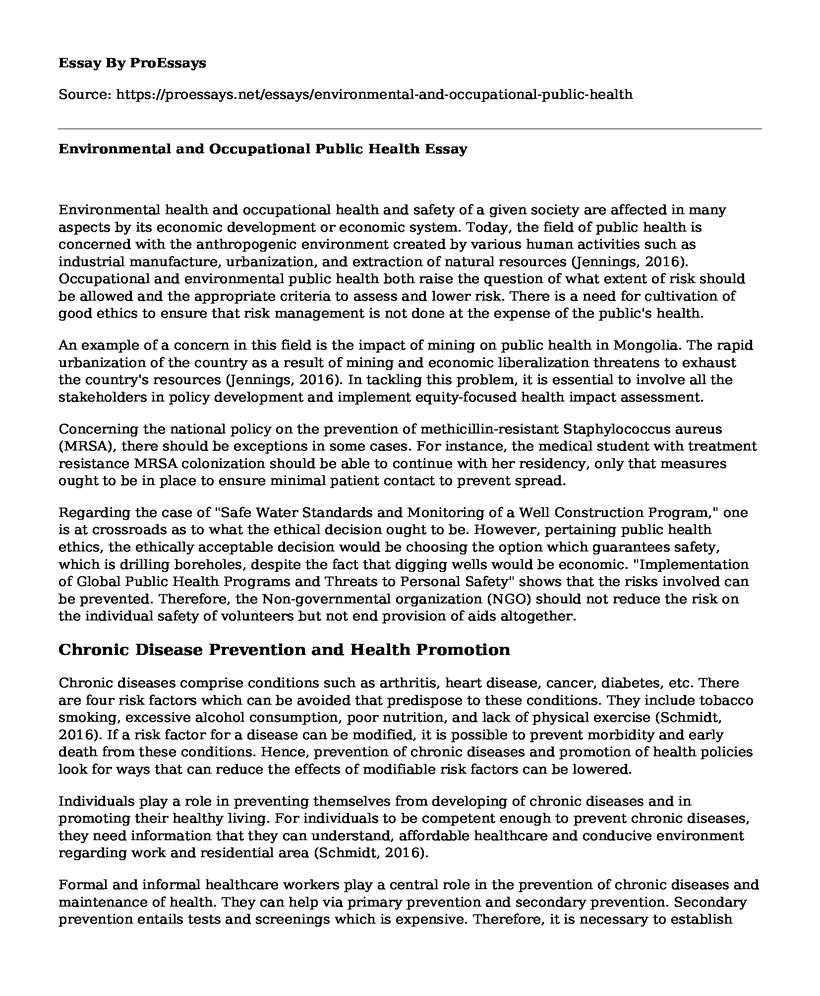Environmental health and occupational health and safety of a given society are affected in many aspects by its economic development or economic system. Today, the field of public health is concerned with the anthropogenic environment created by various human activities such as industrial manufacture, urbanization, and extraction of natural resources (Jennings, 2016). Occupational and environmental public health both raise the question of what extent of risk should be allowed and the appropriate criteria to assess and lower risk. There is a need for cultivation of good ethics to ensure that risk management is not done at the expense of the public's health.
An example of a concern in this field is the impact of mining on public health in Mongolia. The rapid urbanization of the country as a result of mining and economic liberalization threatens to exhaust the country's resources (Jennings, 2016). In tackling this problem, it is essential to involve all the stakeholders in policy development and implement equity-focused health impact assessment.
Concerning the national policy on the prevention of methicillin-resistant Staphylococcus aureus (MRSA), there should be exceptions in some cases. For instance, the medical student with treatment resistance MRSA colonization should be able to continue with her residency, only that measures ought to be in place to ensure minimal patient contact to prevent spread.
Regarding the case of "Safe Water Standards and Monitoring of a Well Construction Program," one is at crossroads as to what the ethical decision ought to be. However, pertaining public health ethics, the ethically acceptable decision would be choosing the option which guarantees safety, which is drilling boreholes, despite the fact that digging wells would be economic. "Implementation of Global Public Health Programs and Threats to Personal Safety" shows that the risks involved can be prevented. Therefore, the Non-governmental organization (NGO) should not reduce the risk on the individual safety of volunteers but not end provision of aids altogether.
Chronic Disease Prevention and Health Promotion
Chronic diseases comprise conditions such as arthritis, heart disease, cancer, diabetes, etc. There are four risk factors which can be avoided that predispose to these conditions. They include tobacco smoking, excessive alcohol consumption, poor nutrition, and lack of physical exercise (Schmidt, 2016). If a risk factor for a disease can be modified, it is possible to prevent morbidity and early death from these conditions. Hence, prevention of chronic diseases and promotion of health policies look for ways that can reduce the effects of modifiable risk factors can be lowered.
Individuals play a role in preventing themselves from developing of chronic diseases and in promoting their healthy living. For individuals to be competent enough to prevent chronic diseases, they need information that they can understand, affordable healthcare and conducive environment regarding work and residential area (Schmidt, 2016).
Formal and informal healthcare workers play a central role in the prevention of chronic diseases and maintenance of health. They can help via primary prevention and secondary prevention. Secondary prevention entails tests and screenings which is expensive. Therefore, it is necessary to establish which method is efficient and cost-effective.
Government and corporate entities also play a role in disease prevention and health promotion. Corporate entities can help by sharing of useful information on the subject to their customers. The government can help through the formulation of policies that promote healthy habits and discourage risk factors.Conclusion
In conclusion, the prevention of chronic diseases and promotion of health and environmental and occupational public health both entail risk factors. In both, it is essential to assess the risk factors and determine what would be more beneficial and ethically acceptable.
References
Jennings, B. (2016). Environmental and Occupational Public Health. Public Health Ethics Analysis, 177-202. doi:10.1007/978-3-319-23847-0_6
Schmidt, H. (2016). Chronic Disease Prevention and Health Promotion. Public Health Ethics Analysis, 137-176. doi:10.1007/978-3-319-23847-0_5
Cite this page
Environmental and Occupational Public Health. (2022, Mar 29). Retrieved from https://proessays.net/essays/environmental-and-occupational-public-health
If you are the original author of this essay and no longer wish to have it published on the ProEssays website, please click below to request its removal:
- Sociology Paper Sample: Disabled People's Rights in St. Vincent and the Grenadines
- Free Paper with Cancer Article Review
- SOP for My Dental School Paper Example
- Questions and Answers Essay on Nursing and Drugs
- Essay Sample on Labor Relations
- Essay Example on Grow Up, Grow Wise: Navigating Communication Conflicts
- Paper Example on Food Deserts: Causes of Nutritional Inequality







